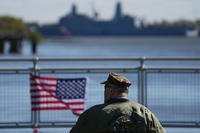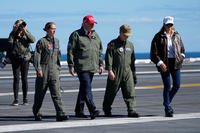Defense Secretary Chuck Hagel will return to the Pacific next week for his fourth trip to the region with plans to address the growing tensions between China and its neighbors over the Spratly Islands.
The Spratly Islands are just one of many Pacific island disputes over natural resources that played a part in the overall U.S. defense strategy that pivots U.S. military resources from the Middle East to the Pacific.
Hagel will meet with defense leaders from the Association of Southeast Asian Nations, or ASEAN, in Honolulu at the beginning of a longer trip through the Pacific region including stops in Japan, Mongolia and China, Pentagon officials said.
Discussions with ASEAN leaders are expected to focus on regional alliances and methods for resolving territorial disputes by addressing China's long-standing claim to the Spratly Islands in the South China Sea, Pentagon officials added.
"China has been more assertive on their maritime claims in recent years. This involves increased naval patrols through zones or areas claimed by other countries," a senior Pentagon official said.
The Spratly Islands includes an area of more than 750 reefs, small islands and atolls in the South China Sea off the coasts of the Philippines, Malaysia and Vietnam. Highly disputed for centuries, the area is rich in oil and natural gas. The Chinese estimate there to be 213 billion barrels of oil around the Spratly Islands.
Countries claiming rights to territory in the Spratly Islands include China, Malaysia, Vietnam, Philippines, Taiwan, and Brunei.
China appears to claim most, if not all of the South China Sea, through its so-called nine-dash line, which vaguely asserts control, access and sovereignty over 1.4 million square miles of islands, Pentagon officials said.
Although U.S. officials say China has not clearly articulated what it means, the nine-dash line can be traced back to China's ruling party from 1928 to 1949, the Koumintang. The Koumintang retreated to Taiwan in 1949 when the Communist Party of China took over following civil war in the country, however the concept of the nine-dash line has endured.
The U.S. has officially gone on record saying that the People's Republic of China's nine-dash line is not in accordance with existing international law.
In February, Assistant Secretary of State for East Asian and Pacific Affairs Danny Russel testified before the House Committee on Foreign Affairs stating that "under international law, maritime claims in the South China Sea must be derived from land features."
"Any use of the nine-dash line by China to claim maritime rights not based on claimed land features would be inconsistent with international law," Russel said.
He also indicated that the U.S. would welcome an opportunity to hear China clarify its nine-dash line claim and bring it in accordance with the international law of the sea.
At stake are the vast troves of oil and natural gas reserves in and around the Spratly Islands. The manner in which the U.S. and ASEAN deals with the Spratly Islands could also set a precedent for the other disputed island chains involving China to include the Senkaku/Diaoyu Islands in the East China Sea.
China has already shown that it will wield the might of its military to protect the country's claims to these islands. The Chinese launched a military faceoff in 2012 with the Japanese when it sent Chinese navy ships to the Senkaku/Diaoyu Islands that are claimed by both countries.
Like the Spratly Islands, the Senkaku/Diaoyu Islands are valued for their wealth of oil reserves believed to be around the islands. Defense analysts worry the Chinese could set off a string of military engagements in the region should the Chinese navy try to enforce their rule over these islands.
The disputes over these island chains address debates over the laws of the sea -- a contentious topic itself -- and what laws should be recognized.
The U.S. has still not formally joined the U.N. Law of the Sea Convention, however Pentagon officials say the U.S. recognizes and abides by its provisions. Several efforts over the years to officially ratify the convention have stalled in Congress, Pentagon officials said.
Under the U.N. Convention on the Law of the Sea, there are no provisions granting rights to waters without regard to land-based sovereign rights. The U.N. treaty specifies that territorial waters extend for 12 miles off of the coast of sovereign territory, a Pentagon official explained.
The U.N. treaty also specifies that up to 200 miles off the coast of a country is considered part of an economic exclusive zone. This means the host country has exclusive first rights to resources and any economic related activities.
"Countries can't do things that threaten the resources but other than that it is high seas freedoms. China conducted military exercises within the U.S. [economic exclusive zone] around Guam," a Pentagon official said.
-- Kris Osborn can be reached at kris.osborn@monster.com
-- Michael Hoffman can be reached at mike.hoffman@monster.com






























